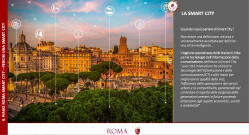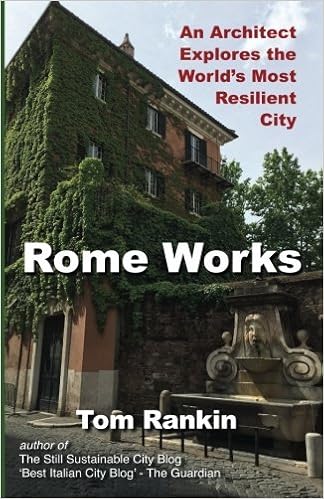Smart City Plan

This quick post is little more than a placeholder for a larger discussion about the role of digital technology in the city, specifically in this “eternal” city. I’ve been teach a course on the topic “Smart City Rome” — actually just one module in a course about four European cities, including Vienna, Granada and Paris — and have been intrigued with the notion since studying with William Mitchel (“Mr. Cybercities”) at Harvard and various encounters with Carlo Ratti and the Senseable Cities Lab at MIT.
I am happy that Rome is moving forward in its efforts to embrace digital technology. Like “sustainable” cities and social justice and equity, there is nothing not to like. The plan announced in the Fall of 2019 and launched publicly today covers the right objectives. The role of the “city user” as a protagonist, not just a recipient, is on target.
I haven’t had time to dig deeper but I’m intrigued by the mention of 81 projects already underway. What are they? There is no link to further information and as much as I am drawn to zoom in on the PDF the enticing descriptions are illegible. How does the interested city user learn more?
This leads to my general skeptical reaction about smart city jargon in the context of Roma Capitale. I really DO appreciate the intentions but it’s impossible not to observe a serious disconnect between the language and the reality of the city.
Titles such as “una citta’ aperta” (an open city) clash against the realities on the ground. Just today I was turned away from crossing (as a pedestrian) Piazza Colonna and Piazza del Campidoglio, told by police that for undisclosed reasons these public spaces were not accessible.
The ATAC app which should track the arrival time of city buses simple said “no buses”. The civic platform built to receive citizen complaints still took way too many steps to insert the most obvious observations: that most of the pedestrian islands in the city are inundated with private cars, and the smart platform does nothing to change that. As Greta might say, our house is on fire so it’s a bit late to discuss the newest smart smoke sensors.
I don’t want to end this on the usual (Roman) defeatist note, criticizing one solution because there are other problems. That is too easy and not too helpful. Let’s just ask nicely that the obvious dysfunctions be addressed and not ignored so we can turn our focus to the good stuff, like smart, sustainable, equitable, edible and fantastic cities.


